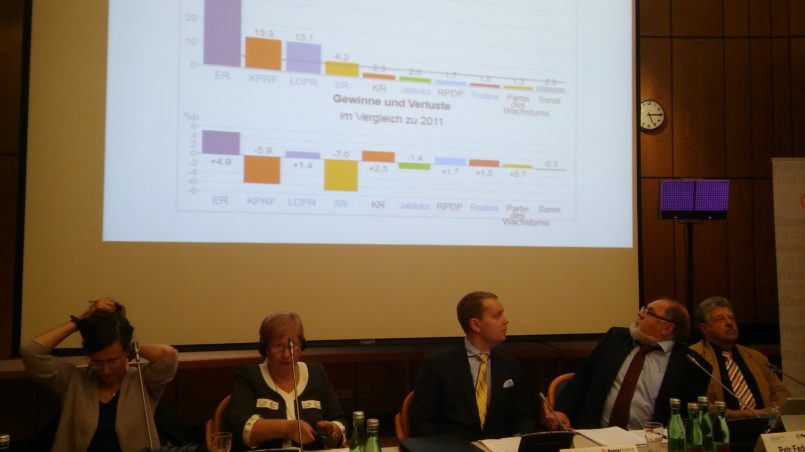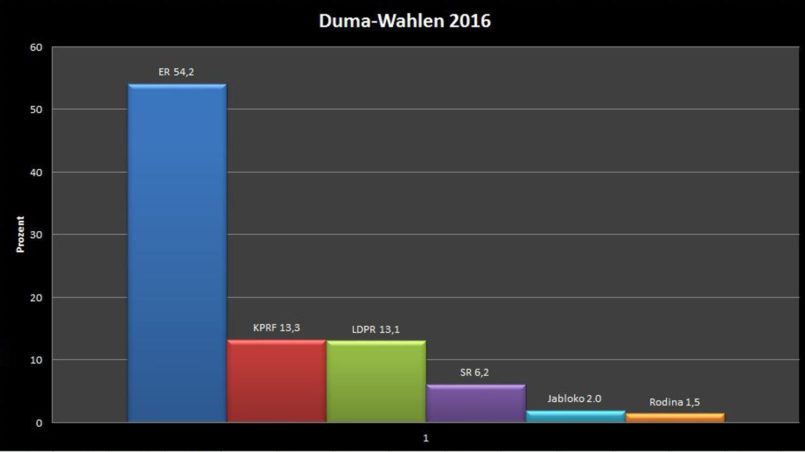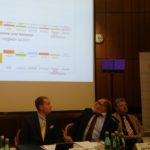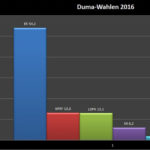Russia after the Parliamentary Elections

The participants at the discussion were in agreement as to the reasons why the turnout was only almost 48%: the date of the election directly after the summer break contributed to this as well as the brief and dull election campaign with few scandals and without major protests. In Moscow and St. Petersburg the turnout was well below 40%. City dwellers traditionally vote for the liberals and the fact that they did not vote led to a resounding victory for Putin’s party, United Russia. The majority of the other parties which succeeded in gaining seats can be referred to as the systemic opposition: they recognise the valid rules of play and the power relationships which can be seen in the fact that all parties which gained seats in the Duma with party status (and that is only four) voted for the elections to be brought forward. Wladimir Schirinowski’s far-right party, LDPR, which came third, and the Communists of the KPRF are part of this systemic opposition. According to Pjotr Fedosov, it is the aim of only the liberal parties, Jabloko and Parnas, which achieved well below 5%, to change the system in a sustainable manner. As such, they are faced with the problem that they have not achieved party status due to their modest size and thereby do not receive any financial support from the state. Also due to the latest reforms of electoral law, the private financing of parties has been greatly restricted. A joint candidate with other smaller parties failed as a result of too diverse views. In the media loyal to the Kremlin, the two parties were presented as national traitors. Alexei Nawalny‘s progressive party was not even allowed to take part in the elections.
The clear victory for United Russia was a surprise for some because, since the last elections, the economic situation has worsened dramatically as evidenced by the falling rubel. However, the Crimea crisis, i.e. the approval of the population to various actions on the peninsula, led to a consolidation of the Russian society to Putin, according to Fedosov. The sanctions imposed by the west also contributed.
Ms Shestopal highlighted the personnel revolution, which has been taking place in Russian power circles in the past few months. If one looks at the list of governors, it is apparent that three of the eight posts were filled in July of this year. Sergej Iwanow, Chief of Staff of the powerful Kremlin administration, had to resign in August and was replaced by the (then) deputy and Japanologist, Anton Waino. This change in the elite had been planned for a long time as many leading politicians had already reached an advanced age and Putin wanted to break away from the strict nationalists. The problem is, according to Shestopal, that Putin does not have enough choices. The system, which is still based on corruption, is ineffective and does not allow the advancement of many capable people. The effect, which can be observed in Russia that staff work little or not at all when there is a change in their superiors, should be circumvented by filling many vacant positions in one fell swoop, as happened in summer this year. Peter W. Schulze believes it is possible that this re-structuring is an indication that, already next year, Vladimir Putin will present a successor – one candidate would be Alexej Djumin.
According to Shestopal, the Russians consider themselves to be in real danger – be it the economic crisis, be it NATO approaching their borders, be it terror. The political scientist explained this feeling not as the result of propaganda but rather as being triggered by real developments. The population is politically demobilised and only interested in the presidential elections – hence, the low turnout.
Peter W. Schulze paid special attention to the reasons why the election was brought forward: he considers central the emerging erosion of the social situation and the economic prospects. The budget will be presented in autumn and after the Russian reserve funds have been drastically reduced since 2009 (at that time they were filled with 560 billion dollars) – as a result of additional payments in the case of pensions, social support and infrastructure projects – and could be totally used up in six to twelve months, tax increases and cuts in the social field are to be expected in the budget negotiations. In early summer strikes were held in many regions but these were hardly reported on in the media. Further, the economic sanctions imposed by the West have led to price increases for many products. The cushioning import substitution policy of the Russian government only concerns food products. The revenue from oil exports has greatly decreased due to the crashing oil price – in the budget 80 dollars is quoted, at the moment it is 50 dollars. We also know this problem in Saudi Arabia.

Russia and Europe
According to Schulze, there are discernible changes in Russia’s conduct as regards foreign relations. Russia has returned to international politics – whether in Syria, Iran, the Ukraine or the Caucasus. The chances to gain territory and influence have already been exhausted and, as such, this „success model“ of Putin – to anchor Russia once again in the global community – has reached its limits as a power base. In Germany, Schulze only considers the SPD and the left-wing to have a balanced view towards Russia while the Greens are among the fiercest critics of Russia.
In light of the Ukraine crisis and the accompanying sanctions, the relationship between the EU and Russia is tense. With the entry of representatives from Crimea in the Duma election (e.g. Natalia Poklonskaja who has become famous on the Internet), many Russians see the annexation of the peninsula as already institutionalised. The EU is involved in internal conflicts and is seeking ways to deal with China (see the new „Silk Road“), Central Asia and also Russia.
Igor Fedosov, like the majority of participants in the discussion, called for an easing of the tension with Russia. The sanctions above all strengthen Putin’s domestic position. They do indeed restrict the access to money as well as the access to technical developments for Russia but they could lead to unpredictable political developments which Europe cannot endorse. The proposal of Foreign Minister, Steinmeyer, to lift the sanctions step-by-step met with little support in Germany and Europe. It is vital that the propaganda war ceases on BOTH sides and that civil society is strengthened e.g. by means of the revived Petersburger Dialogue.
Germany’s Eastern policy after 2009 is the main reason for Russia’s departure from Europe according to Schulze. Putin and Medwedew repeatedly offered to co-operate with Europe – one can think of Putin’s speech in the German Bundestag in 2001. But Germany, above all since 2009 (US hardliner: „German foreign policy has to be sharpened“) has committed itself to the interests of the USA, leading to a re-orientation on the part of Russia which is perceptible in the BRICS states and the Eurasian Economic Union. The campaign against Russia is being pursued above all by the Balts, the Swedes, the Danes, the British and the Poles. The USA itself no longer has to intervene in Europe, the desired ruling from within has already been achieved if one observes the policy and media within the EU. Steinmeyer is still fighting against this policy but the „intelligent handling of the sanctions“ – whereby he means that it makes no sense to bind the sanctions to the Minsk Agreement since both sides would regularly breach this agreement – has met with little support, least of all in the leading media. De facto it would suffice if one state vetoed the sanctions at the next vote.
The well-known, and in some cases (Front National, AfD) proven, financial connections of Russia to the right-wing parties in European countries is met with positive resonance in the Russian media. Marine Le Pen is popular even if she is not expected to do well in the presidential elections.
The hacker attacks against the USA, allegedly initated by Russia, which, according to the American secret services, were intended to influence the current election campaign, could in the future lead to major conflicts because NATO has expanded its support to cyber attacks.
The intensive discussion on western and Russian media – in particular between Jutta Sommerbauer and Peter W. Schulze – highlighted the diversity of views regarding neutral reporting and state influence and the conviction of many western journalists that the propaganda in the west is significantly less pronounced than that in Russia. The objection that Schulze’s students have studied western propaganda in various theses and arrived at shocking results was met with extreme scepticism.
Credits
| Image | Title | Author | License |
|---|---|---|---|
 |
Duma-Elections 2016 | Christian Janisch | CC BY-SA 4.0 |
 |
Duma-Elections 2016 | Christian Janisch | CC BY-SA 4.0 |
